
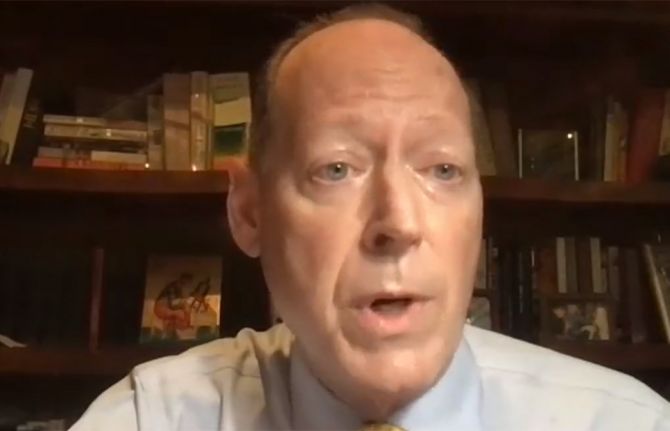
Press Statement
Remembering a global health advocate and renowned doctor
07 March 2022 07 March 2022UNAIDS is deeply saddened at the death of Paul Farmer
GENEVA, 11 March 2022—UNAIDS is deeply saddened at the death of Paul Farmer, anthropologist, doctor and global health champion. He was Kolokotrones University Professor and Chair of the Department of Global Health and Social Medicine at Harvard Medical School, Chief of the Division of Global Health Equity at Brigham and Women’s Hospital in Boston and co-founder of Partners in Health.
“Paul Farmer fought for social justice and human rights and passionately believed in the right to health for all,” said Winnie Byanyima, the Executive Director of UNAIDS. “His work saved millions and showed us the way to reach health care with dignity.”
Partners in Health, a social justice organization founded more than three decades ago, establishes long-term relationships with sister organizations based in settings of poverty. Its main goal is to bring the benefits of modern medical science to those most in need.
In 2000, Mr Farmer and colleagues proved that community-based approaches to HIV treatment in poor settings worked. In 2000, an estimated 4.7 to 8.9 million African children aged 0–17 years had lost one or both parents due to AIDS and HIV had become the world’s leading infectious cause of death among adults with more than 90% of those deaths occurring in low- and middle-income countries. Many had argued that the high cost of antiretroviral medicines (more than US$ 10 000 annually) and the lack of health infrastructure would mean that progress against AIDS would be impossible, but Mr Farmer and his team proved them wrong. His pilot HIV treatment programme in a poor community in rural Haiti that relied on an existing tuberculosis-control infrastructure showed that positive results could be made among people with advanced HIV.
Mr Farmer also advocated that HIV treatment could reinvigorate HIV prevention programmes and argued that, from his experience in Haiti and Rwanda, the rollout of effective antiretroviral therapy lessened HIV-related stigma and discrimination.
In 2012, Mr Farmer and his team celebrated the fact that almost 10 million people living in low- and middle-income countries were on antiretroviral therapy. Later, he focused on people dying of hepatitis C, like HIV a treatable and preventable disease, and regretted that at the time of his death nearly 10 million people living with HIV still did not have access to treatment.
In late November 2021, Mr Farmer joined a virtual UNAIDS panel ahead of World AIDS Day. He stressed that all human lives have the same value and that everyone has the inalienable right to be healthy and to fulfil their potential. Drawing parallels between COVID-19 and HIV, he said, “Inequality is a major driver of pandemics in general. As with AIDS as with structural racism, gender inequality and various forms of social marginalization, active processes continue to structure risk for COVID-19 and also for the fruits of science that have been marshalled to fight it.”
UNAIDS is saddened by the death of Prof Paul Farmer, a passionate advocate for HIV treatment, who showed the world that AIDS-related deaths can be reversed with access, rights & compassion. The global health community has lost a pioneering leader, but his work will continue on. pic.twitter.com/UVS7JP8xuj
— UNAIDS (@UNAIDS) February 21, 2022
He added, “We are now living in a time of vaccine apartheid ... were we to have had a vaccine for HIV, it would be a similar challenge. So, it is, in fact, not two different pandemics posing two discreet sets of challenges but two colliding pandemics.”
As Mr Farmer repeated over and over again during his life, it is our collective duty to take the steps needed to tackle inequalities. UNAIDS, in its 2021 World AIDS Day report, Unequal, unprepared, under threat: why bold action against inequalities is needed to end AIDS, stop COVID-19 and prepare for future pandemics, warned that if the transformative measures needed to end AIDS are not taken, the world will also stay trapped in the COVID-19 crisis and remain dangerously unprepared for the pandemics to come.
Partners in Health has organized an online memorial service at 10:00–12:00 Eastern Time (16:00–18:00 Central European Time) on 12 March 2022 to honour his work.
Region/country


Press Statement
UNAIDS urges protection and continuity of health and HIV services for people living with and affected by HIV in Ukraine
25 February 2022 25 February 2022GENEVA, 25 February 2022—Amidst the ongoing military offensive against Ukraine, UNAIDS is calling for the protection of health workers and uninterrupted continuation of HIV and health services for all people, including people living with and affected by HIV. Ukraine has the second largest AIDS epidemic in the region. It is estimated that there are 260 000 people living with HIV in Ukraine, 152 000 of whom are on antiretroviral therapy, medication that needs to be taken daily for people to remain alive and well.
“People living with HIV in Ukraine only have a few weeks of antiretroviral therapy remaining with them, and without continuous access their lives are at risk,” said Winnie Byanyima, UNAIDS Executive Director. “The hundreds of thousands of people living with and affected by HIV in Ukraine must have unbroken access to life-saving HIV services, including HIV prevention, testing and treatment.”
To date, the Government of Ukraine, together with civil society and international organizations, has implemented one of the largest and most effective HIV responses in eastern Europe and central Asia. However, with the ongoing military offensive, the efforts and gains made in responding to HIV are in serious risk of being reversed, putting even more lives in danger.
The right to health and access to HIV services must always be protected, and health workers, representatives of civil society and their clients must never be targets in a conflict. The ongoing military conflict has affected everyone in Ukraine but is likely to be particularly hard for people living with HIV and key populations, including people who use drugs, sex workers, gay men and other men who have sex with men and transgender people.
As highlighted by the United Nations Secretary-General, the United Nations is committed to support people in Ukraine, who have already suffered from “so much death, destruction and displacement” from the military offensive, in their time of need.
With the support of the Global Fund to Fight AIDS, Tuberculosis and Malaria, the United States President’s Emergency Plan for AIDS Relief and UNAIDS, the Government of Ukraine and civil society partners have delivered HIV prevention and treatment services for people living with HIV and key populations across Ukraine for many years and stand ready to give further support during the ongoing crisis.
UNAIDS staff remain on the ground in Ukraine, working to ensure that people living with HIV and key populations in Ukraine have continued access to life-saving services, with a particular focus on the most vulnerable civilians. UNAIDS will continue to support HIV prevention, testing, treatment, care and support for people across Ukraine affected by the crisis.
UNAIDS
The Joint United Nations Programme on HIV/AIDS (UNAIDS) leads and inspires the world to achieve its shared vision of zero new HIV infections, zero discrimination and zero AIDS-related deaths. UNAIDS unites the efforts of 11 UN organizations—UNHCR, UNICEF, WFP, UNDP, UNFPA, UNODC, UN Women, ILO, UNESCO, WHO and the World Bank—and works closely with global and national partners towards ending the AIDS epidemic by 2030 as part of the Sustainable Development Goals. Learn more at unaids.org and connect with us on Facebook, Twitter, Instagram and YouTube.
Region/country

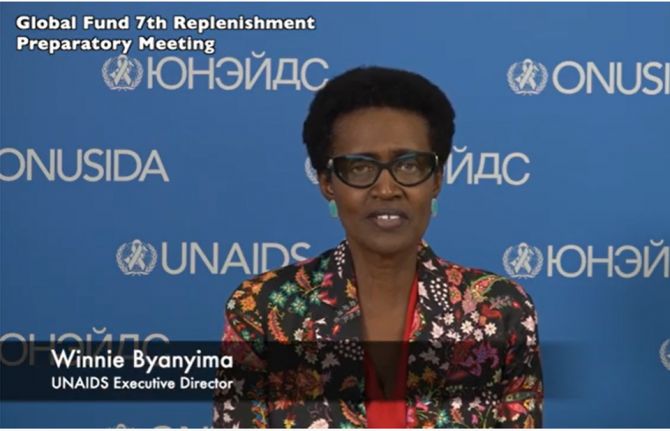
Press Statement
Investment case for the Global Fund's seventh replenishment technical briefing and discussion
23 February 2022 23 February 2022Message by Winnie Byanyima, Executive Director of UNAIDS and Under-Secretary-General of the United Nations
Excellencies, distinguished guests, colleagues and friends,
I am sorry not to be with you in person today.
This year will be 41 years since the first cases of AIDS were reported, 26 years since the Joint United Nations Programme on HIV/AIDS started its work and 21 years since the Global Fund to Fight AIDS, Tuberculosis and Malaria (Global Fund) partnership came into existence. Since then, communities, countries, activists, technical partners and donors have come together to deliver impressive results.
Throughout it all, the Global Fund has been a key player and an important funder of critical interventions. Thanks to Global Fund grants, AIDS-related deaths have dropped by 65% and new HIV infections by 54% since 2002. Global Fund grants support 22 million people on life-saving HIV treatment, keeping them healthy and strong.
And yet the world did not meet the 2020 HIV targets. Progress, which was already off track, is now under even greater strain as the COVID-19 crisis continues to rage, disrupting HIV prevention and testing services, schooling, violence prevention programmes and more. We know that HIV infection makes a person much more likely to die of COVID-19. We also know that sub-Saharan Africa is home to two thirds of people living with HIV. But just over 12% of people in Africa have received two doses of a COVID-19 vaccine. This is a terrible health injustice and one that the AIDS community is far too familiar with given the history of unequal access to the first antiretroviral medicines.
We know that new HIV infections and AIDS-related deaths follow the fault-lines of inequality.
Women and girls account for the majority of new HIV infections in sub-Saharan Africa—six in seven new HIV infections among adolescents are among adolescent girls. This shocking disparity all is about discrimination against girls and women in society and social norms that tolerate violence and exclusion.
In 2020, key populations, including sex workers, gay men and other men who have sex with men, people who inject drugs and transgender people, and their sexual partners accounted for 39% of new HIV infections in sub-Saharan Africa, 65% of new infections globally and a staggering 94% in the Asia–Pacific region.
To close the inequality gaps that drive AIDS, last year we adopted the Global AIDS Strategy 2021–2026: End Inequalities, End AIDS. That strategy sets out evidence-informed priority actions and bold targets to get every country and every community on track to end AIDS as a public health threat by 2030.
Achieving the goals and targets of the Global AIDS Strategy 2021–2026 requires that annual HIV investments in low- and middle-income countries rise to a peak of US$ 29 billion by 2025. This is of course a shared responsibility, with domestic and international resources coming together.
The strategy was reaffirmed by the bold United Nations Political Declaration on AIDS, adopted at the United Nations General Assembly in June last year. The new Global Fund strategy is very much in line with the path the world has chosen to end AIDS.
We now need a successful seventh replenishment in order to reach the agreed targets and get back on track towards the 2030 goal of ending AIDS, tuberculosis and malaria.
The Global Fund provides more than 20% of international funding for the HIV response, making it one of the key players in our collective effort to end AIDS. I have no doubt that my friend Peter Sands and Timothy Hallet have set out a very compelling case for a fully funded Global Fund. So many lives and futures, hopes and dreams depend on this!
The United States of America was one of the founding supporters of the Global Fund and is the largest donor and we are delighted that the United States is hosting the seventh replenishment conference—a clear sign of the United States’ steady leadership of global health.
UNAIDS will, as always, support the Global Fund to ensure a successful replenishment and I urge everyone to step up and support it at this critical moment for pandemics, old and new, and global health.
Thank you.
UNAIDS
The Joint United Nations Programme on HIV/AIDS (UNAIDS) leads and inspires the world to achieve its shared vision of zero new HIV infections, zero discrimination and zero AIDS-related deaths. UNAIDS unites the efforts of 11 UN organizations—UNHCR, UNICEF, WFP, UNDP, UNFPA, UNODC, UN Women, ILO, UNESCO, WHO and the World Bank—and works closely with global and national partners towards ending the AIDS epidemic by 2030 as part of the Sustainable Development Goals. Learn more at unaids.org and connect with us on Facebook, Twitter, Instagram and YouTube.
Watch


Press Statement
Co-discoverer of HIV, Luc Montagnier, has died at the age of 89
11 February 2022 11 February 2022GENEVA, 11 February 2022—The French virologist and co-discoverer of HIV, Luc Montagnier, sadly died this week. He was an expert on retroviruses and a pioneer in HIV science. He founded and directed the Viral Oncology Unit at the Pasteur Institute in France, where he led the team that discovered HIV, research that was first published in the journal Science in 1983.
He was one of the earliest advocates for promoting HIV prevention and treatment and for fighting against stigma and discrimination against people living with and affected by HIV. In 2008, he was jointly awarded the Nobel Prize in Physiology or Medicine for the discovery of HIV.
“Luc Montagnier dedicated his life to science and his co-discovery of HIV paved the way for research into and development of antiretroviral medicines, which have saved the lives of millions of people around the world,” said Winnie Byanyima, Executive Director of UNAIDS. “UNAIDS sends its heartfelt condolences to his family and friends at this difficult time.”
Since the start of the AIDS pandemic 79 million people have become infected with HIV and 39 million people have died of AIDS-related illnesses. In 2020, there were around 38 million people living with the virus 10 million of whom did not have access to treatment – demonstrating the urgent need to end the pandemic caused by the virus which was discovered by Luc Montagnier 40 years ago.
UNAIDS
The Joint United Nations Programme on HIV/AIDS (UNAIDS) leads and inspires the world to achieve its shared vision of zero new HIV infections, zero discrimination and zero AIDS-related deaths. UNAIDS unites the efforts of 11 UN organizations—UNHCR, UNICEF, WFP, UNDP, UNFPA, UNODC, UN Women, ILO, UNESCO, WHO and the World Bank—and works closely with global and national partners towards ending the AIDS epidemic by 2030 as part of the Sustainable Development Goals. Learn more at unaids.org and connect with us on Facebook, Twitter, Instagram and YouTube.

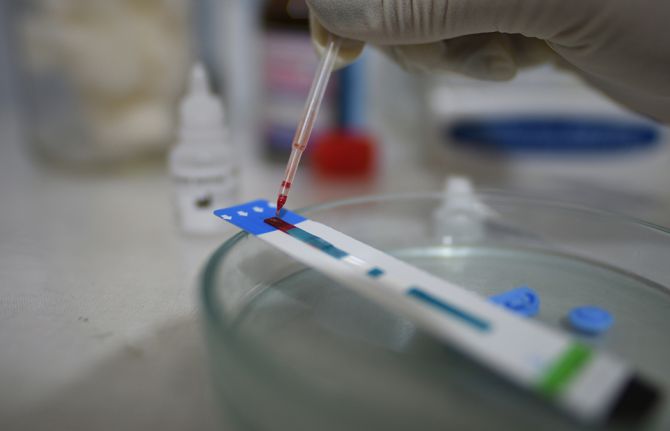
Press Statement
Identification of fast-spreading HIV variant provides evidence of urgency to halt the pandemic and reach all with testing and treatment
07 February 2022 07 February 2022Around 10 million people living with HIV are still not on antiretroviral therapy
GENEVA, 7 February 2022—Newly published research from the Netherlands has revealed the existence of a more transmissible and damaging variant of HIV. People living with the newly revealed HIV subtype experience double the rate of immune system decline (CD4 count), have higher HIV viral loads (amount of virus in the blood) and are vulnerable to developing AIDS two to three times faster after diagnosis than if they were living with other strains of the virus. The study, led by researchers from the University of Oxford’s Big Data Institute, was the first to discover this highly virulent variant of the subtype-B of HIV. The study also revealed that the variant has been circulating in the Netherlands for years and remains receptive to HIV treatment.
The HIV pandemic continues to take a life every minute and scientists have long worried about the evolution of new, more transmissible, variants of HIV. This newly identified variant does not represent a major public health threat but underscores the urgency of speeding up efforts to halt the HIV pandemic.
“Ten million people living with HIV worldwide are not yet on treatment, fuelling the continued spread of the virus and potential for further variants,” said Eamonn Murphy, UNAIDS Deputy Executive Director, Programme, a.i. “We urgently need to deploy cutting-edge medical innovations in ways that reach the communities most in need. Whether it’s HIV treatment or COVID-19 vaccines, inequalities in access are perpetuating pandemics in ways that harm us all.”
HIV remains the deadliest pandemic of our time—an estimated 79 million people have become infected with the virus, for which there is still no vaccine and no cure. Some 36 million people have died from AIDS-related illnesses since the start of the pandemic and 1.5 million people were newly infected with HIV in 2020. Of the 38 million people living with HIV today, 28 million are on life-saving antiretroviral therapy, keeping them alive and well and preventing transmission of the virus.
UNAIDS
The Joint United Nations Programme on HIV/AIDS (UNAIDS) leads and inspires the world to achieve its shared vision of zero new HIV infections, zero discrimination and zero AIDS-related deaths. UNAIDS unites the efforts of 11 UN organizations—UNHCR, UNICEF, WFP, UNDP, UNFPA, UNODC, UN Women, ILO, UNESCO, WHO and the World Bank—and works closely with global and national partners towards ending the AIDS epidemic by 2030 as part of the Sustainable Development Goals. Learn more at unaids.org and connect with us on Facebook, Twitter, Instagram and YouTube.
Contact
UNAIDS GenevaSophie Barton-Knott
tel. +41 79 514 68 96
bartonknotts@unaids.org
UNAIDS Media
communications@unaids.org

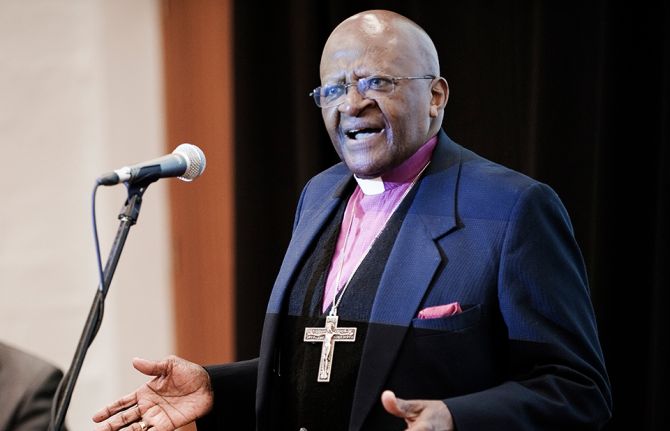
Press Statement
The global AIDS response has lost a great champion
26 December 2021 26 December 2021UNAIDS is deeply saddened at the passing of Archbishop Emeritus Desmond Tutu
GENEVA, 26 December 2021—UNAIDS is deeply saddened at the passing of Archbishop Desmond Tutu who fought against apartheid in South Africa and combated racism and injustice worldwide. He was a powerful voice in the fight against AIDS, combating denial, demanding access to treatment for all, calling out against discrimination of people living with HIV, and championing the human rights of lesbian, gay, bisexual and transgender people, women, and children. His work on HIV and tuberculosis prevention and treatment changed global paradigms and saved many lives.
“A giant has fallen. Archbishop Tutu was a freedom fighter, a holy man, a great hero who played a history-shaping role in the liberation of Africa,” said Winnie Byanyima, Executive Director of UNAIDS. “He was a leading light who brought global attention to injustice in a way few others could and a champion for the rights of all people living with and affected by AIDS. Millions are alive and free today because of the path he charted and the hope he brought to this world.”
Archbishop Tutu was outspoken in calling for an end to AIDS denialism in South Africa. He fought for access to lifesaving medicines. "People, not profits, must be at the centre of patent law for medicines," he said while calling on pharmaceutical companies to make AIDS medicines accessible. He was also a champion of rights of gay people. He likened laws that criminalize forms of human love as apartheid laws—”so obviously wrong”.
Archbishop Desmond Tutu was an advocate for preventing HIV infection in adolescents and young people. He co-chaired the UNAIDS commission on HIV prevention in 2011 that led to setting bold global targets for HIV prevention. He extolled on young people to take on the leadership on AIDS. “Bold and honest actions are needed, and we look to the next generation of leaders to bring about positive change in attitudes and actions,” said Archbishop Tutu while speaking with young leaders in Robben Island on HIV prevention.
“UNAIDS has lost a friend, guide and mentor,” said Ms Byanyima. “Our thoughts are with his family, the people of South Africa, and many around the world whose lives he touched and changed for the better.”
UNAIDS
The Joint United Nations Programme on HIV/AIDS (UNAIDS) leads and inspires the world to achieve its shared vision of zero new HIV infections, zero discrimination and zero AIDS-related deaths. UNAIDS unites the efforts of 11 UN organizations—UNHCR, UNICEF, WFP, UNDP, UNFPA, UNODC, UN Women, ILO, UNESCO, WHO and the World Bank—and works closely with global and national partners towards ending the AIDS epidemic by 2030 as part of the Sustainable Development Goals. Learn more at unaids.org and connect with us on Facebook, Twitter, Instagram and YouTube.
Region/country

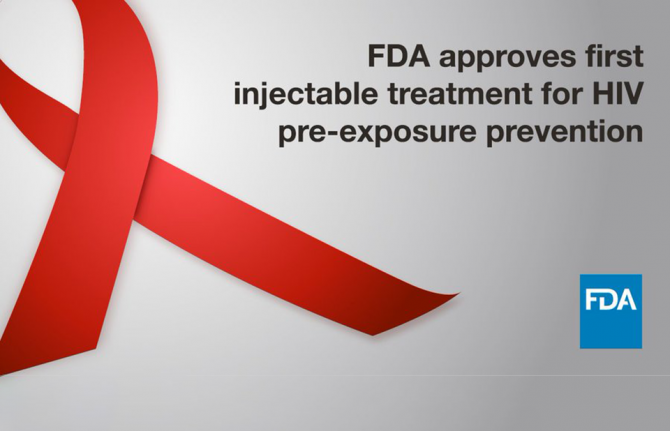
Press Statement
UNAIDS welcomes the approval of long-acting injectable cabotegravir as a pre-exposure prophylaxis for HIV prevention
22 December 2021 22 December 2021The United States Food and Drug Administration announced its first approval of a long-acting HIV prevention medication earlier this week. The long-acting injectable cabotegravir (CAB - LA) is approved as a pre-exposure prophylaxis (PrEP) for adults and adolescents who are at risk of acquiring HIV sexually in the United States of America.
This is the first time an injectable antiretroviral drug becomes available as a pre-exposure prophylaxis for prevention of HIV. The long-acting formula is a step forward and a valuable addition to the HIV prevention toolbox and will make acceptance and adherence easy.
A long-acting PrEP product such as CAB-LA, taken initially as two injections one month apart and then after every two months afterward, could offer a better choice for adults and adolescents at substantial HIV risk who either do not want to take or struggle with taking a daily tablet. Companies holding new technologies should share their knowledge and recipes with generic producers to ensure availability and affordability in low and middle-income countries.
UNAIDS is calling for this new drug to quickly be made available and affordable to people who need it most not just in the United States of America but everywhere in the world. The mistakes of three decades ago when lifesaving drugs were only available to those who could afford it must not be repeated. Market strategies such as generic competition and public health-oriented management of intellectual property rights, either through voluntary agreements or the use of TRIPS flexibilities must be used to make this new drug widely available.
To make this drug available equitably across the world, a series of actions are essential. Firstly, the drug has to be approved by regional and national regulatory authorities in a speedy manner. It is encouraging to see that the developer of CAB-LA, has already submitted to the South African Health Products Regulatory Authority (SAHPRA) for approval and an outcome is expected in early 2022. However access must go much further. Secondly the selling price must come down through a combination of measures such as licencing and involvement of generic producers. Thirdly, national HIV prevention programmes must prepare roll out plans and prepare their health systems and communitiues to deploy this new HIV prevention option as soon as they are available.
Current pre-exposure prohylaxis--Tenofovir plus Emtricitabine—tablets have to be taken daily as oral PrEP. They are highly effective in preventing HIV acquisition among persons at substantial risk when taken as prescribed. However many find it challenging to take a daily tablet. Another option—dapiviringe vaginal ring—is becoming available as additional prevention option for women at substantial risk of HIV infection.
The CAB-LA option could be a game-changer for the HIV response, making PrEP simpler or less burdensome for all genders. This may also circumvent the stigma associated with daily oral therapy and improve correct dosing and adherence which is critical for PrEP effectiveness.
This week’s United States Food and Drug Administration approval follows results from two trials. The first trial, HPTN 083, was conducted in 4 566 gay men and men who have sex with men and transgender women at research centers in Argentina, Brazil, Peru, the United States, South Africa, Thailand, and Vietnam. CAB – LA reduced the risk of sexually acquired HIV by 66% compared to daily oral. In the second trial HPTN 084, among 3,223 at-risk women aged 18-45 across 20 trial sites in seven countries in Sub Saharan Africa (Botswana, Eswatini, Kenya, Malawi, South Africa, Uganda, and Zimbabwe), CAB – LA reduced the risk of acquiring HIV by 89% compared to daily oral PrEP.
UNAIDS
The Joint United Nations Programme on HIV/AIDS (UNAIDS) leads and inspires the world to achieve its shared vision of zero new HIV infections, zero discrimination and zero AIDS-related deaths. UNAIDS unites the efforts of 11 UN organizations—UNHCR, UNICEF, WFP, UNDP, UNFPA, UNODC, UN Women, ILO, UNESCO, WHO and the World Bank—and works closely with global and national partners towards ending the AIDS epidemic by 2030 as part of the Sustainable Development Goals. Learn more at unaids.org and connect with us on Facebook, Twitter, Instagram and YouTube.
Our work
Region/country

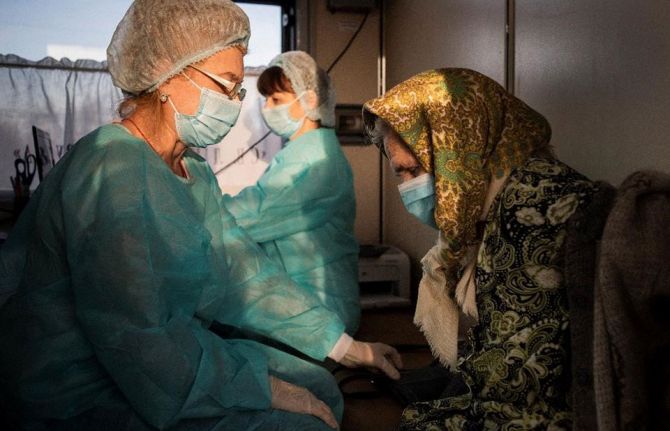
Press Statement
Addressing inequalities to ensure health and rights for all
12 December 2021 12 December 2021Statement by Winnie Byanyima, Executive Director of UNAIDS, on the occasion of Universal Health Coverage Day
12 December 2021
Winnie Byanyima
Executive Director of UNAIDS
Under-Secretary-General of the United Nations
As we commemorate Universal Health Coverage Day 2021, the world is entering year three of the COVID-19 pandemic. The pandemic has reminded us that no one is safe until everyone is safe. It shows how pandemics expose intersecting inequalities among people, countries and communities.
Universal health coverage means that all individuals and communities can access the health services they need without suffering financial hardship. But with at least half the world’s population lacking access to essential health services even before the COVID-19 pandemic, there is much work to do.
We must urgently focus on three things:
- First, addressing the inequalities that prevent us from achieving universal health coverage and from ending AIDS.
- We need people-centred data systems that highlight inequalities and prioritize work to address them.
- We must put human rights at the centre. The Political Declaration of the United Nations High-Level Meeting on Universal Health Coverage in 2019 called on countries to “reach the furthest behind first”.
- Second, strengthening support to community-based and community-led responses.
- Four decades of the AIDS response have demonstrated that such support is a crucial pillar for effective pandemic responses.
- Community engagement should be an integral part of health systems.
- Third, bolstering investment in health, sustainable and innovative financing, and ambitious thresholds for financial commitments.
- The Abuja Declaration, signed by African governments, to spend 15% of revenues on health is such an example.
- To achieve universal health coverage and pandemic control, we need a paradigm shift in global health financing and investments in community-led, human rights-based, people-centred and gender transformative responses.
On this Universal Health Coverage Day, I call for support and urgent action to ensure health and rights for all.
UNAIDS
The Joint United Nations Programme on HIV/AIDS (UNAIDS) leads and inspires the world to achieve its shared vision of zero new HIV infections, zero discrimination and zero AIDS-related deaths. UNAIDS unites the efforts of 11 UN organizations—UNHCR, UNICEF, WFP, UNDP, UNFPA, UNODC, UN Women, ILO, UNESCO, WHO and the World Bank—and works closely with global and national partners towards ending the AIDS epidemic by 2030 as part of the Sustainable Development Goals. Learn more at unaids.org and connect with us on Facebook, Twitter, Instagram and YouTube.
Our work


Press Statement
International Human Rights Day: overcoming pandemics by respecting human rights for all
10 December 2021 10 December 2021GENEVA, 10 December 2021—On International Human Rights Day, UNAIDS is calling for concrete action to prevent and respond to systemic human rights violations that create and exacerbate inequalities.
“We live in one of the most unequal times in history,” said the UNAIDS Executive Director, Winnie Byanyima. “What the HIV pandemic had already revealed, COVID-19 has again confirmed: crises and disasters are felt most strongly along the fault lines of society. Those who experience systemic discrimination and inequality are pushed further and further behind.”
Equality and non-discrimination are cornerstones of human rights. The Sustainable Development Goals made them a central element of the global development commitments that call on countries to reduce inequalities, including by removing the drivers of inequalities, such as discriminatory laws and policies.
Multiple and intersecting inequalities that drive the HIV epidemic are a result of human rights violations. Although new HIV infections globally have declined by more than 30% since 2010, progress has not been shared equally. In some countries, access to combination prevention tools such as pre-exposure prophylaxis and harm reduction services has resulted in progress among the most vulnerable groups of people, but in many others criminalization, marginalization, stigma and discrimination are leading to increased HIV incidence. However, during the past five years, countries that took a criminalizing approach to key populations (gay men and other men who have sex with men, sex workers, people who inject drugs, transgender people) made less progress in HIV testing and treatment. In 2020, 65% of new HIV infections were among these key populations, driven by harmful laws, policies and discriminatory social norms that punish, stigmatize and force underground key populations and fail to make available or accessible the prevention, treatment and harm reduction services that could so easily be used to stop HIV transmission and mortality. Six out of seven new HIV infections among adolescents aged 15–19 years in sub-Saharan Africa are among adolescent girls. This is in part because their right to education is not fulfilled on an equal basis with boys, their right to health is breached when comprehensive sexuality education is not provided and their right to bodily autonomy and security of the person is denied when states fail to address harmful gender norms.
In many contexts, international trade agreements conflict with human rights obligations by enforcing excessive intellectual property protections, creating artificial barriers for low- and middle-income countries to access affordable health products, impeding the production and distribution of generic medicines and hampering efforts to support the research and development of innovative health technologies that meet public health needs.
This is a time of parallel and converging crises: multiple pandemics, climate change and continued economic shocks. In the past two years we have seen how profoundly systemic and structural inequalities deepen and widen during times of adversity. We cannot simply weather these crises—we must prevent them from happening. We will only succeed if we make the fundamental structural changes to create a more equal and stronger society, capable of meeting the challenges of today and tomorrow and leaving no one behind. We must dismantle the structures that violate human rights and create and deepen inequalities.
We must strengthen access to health services by eliminating user fees and promoting policies to ensure that health technologies are considered global public goods, not commodities.
We must replace coercive and punitive approaches to emergencies, including to pandemics and to health and other pressing societal issues generally, with enabling, supportive and non-discriminatory solutions.
We must radically transform our concepts of gender to ensure substantive gender equality for all and enable people of all genders to flourish and participate in society on an equal basis.
And we must take action to ensure that the rights of women are girls in all their diversity are realized through concrete measures and investments, not just promises.
We can only succeed if we take as our foundation the fundamental principles of human rights, with communities leading from the front and at all stages of the process.
UNAIDS
The Joint United Nations Programme on HIV/AIDS (UNAIDS) leads and inspires the world to achieve its shared vision of zero new HIV infections, zero discrimination and zero AIDS-related deaths. UNAIDS unites the efforts of 11 UN organizations—UNHCR, UNICEF, WFP, UNDP, UNFPA, UNODC, UN Women, ILO, UNESCO, WHO and the World Bank—and works closely with global and national partners towards ending the AIDS epidemic by 2030 as part of the Sustainable Development Goals. Learn more at unaids.org and connect with us on Facebook, Twitter, Instagram and YouTube.
Our work

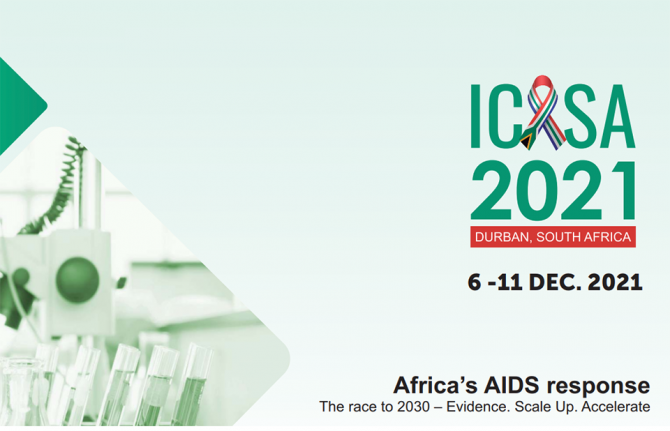
Press Statement
UNAIDS calls for urgent action to end the inequalities driving HIV and other pandemics around the world
06 December 2021 06 December 2021GENEVA/DURBAN, 6 December 2021—As the 21st International Conference on AIDS and Sexually Transmitted Infections in Africa (ICASA) opens in Durban, South Africa, UNAIDS is calling for urgent measures to be taken to reduce the inequalities fuelling the twin pandemics of HIV and COVID-19. The mainly virtual event is being held against the backdrop of increasing COVID-19 infections driven by the new omicron variant of the coronavirus identified by South African researchers last month.
“Progress in AIDS, which was already off track, is now under even greater strain as the COVID-19 crisis continues to rage, disrupting HIV prevention and treatment services, schooling, violence prevention programmes and more,” said UNAIDS Executive Director, Winnie Byanyima. “We cannot be forced to choose between ending the AIDS pandemic that is raging today and preparing for the pandemics of tomorrow. We need African-led solutions and visions of pandemic preparedness.”
The conference is taking place just a week after UNAIDS released its World AIDS Day report, Unequal, unprepared, under threat: why bold action against inequalities is needed to end AIDS, stop COVID-19 and prepare for future pandemics. The report warns that the world could face 7.7 million AIDS-related deaths in the next decade if leaders fail to tackle the inequalities that drive the HIV pandemic.
A total of 25.5 million people are living with HIV in Africa, accounting for two in three of the global number of people living with the virus. There has been good progress in delivering treatment to people who need it over the past decade, with 19.5 million Africans living with HIV now receiving medicines to keep them alive and well, up from 5 million in 2010. But new HIV infections remain too high, at 890 000 in 2020. Women and girls continue to be worst affected, accounting for 62% of all new HIV infections in 2020.
In sub-Saharan, 4200 adolescent girls and young women between 15 and 24 years old become infected with HIV every week. In 2020, key populations (sex workers and their clients, gay men and other men who have sex with men, people who inject drugs, transgender people) accounted for 39% of new HIV infections in sub-Saharan Africa.
However, some countries, particularly in eastern and southern Africa, are showing how sustained progress can be made against the HIV epidemic with the right mix of properly funded evidence-informed programmes that put human rights at the centre of the response. Eswatini, for example, has surpassed the 90–90–90 treatment target (90% of people living with HIV know their HIV status, of whom 90% are on antiretroviral treatment and of whom 90% are virally supressed) to achieve 95–95–95. In Eswatini, Lesotho and South Africa, a higher coverage of combination prevention options, including social and economic support for young women and high levels of treatment coverage and viral suppression for previously unreached populations, have reduced the incidence of new HIV infections among young women and girls. Botswana last week became the first country with a high-burden HIV epidemic to be certified as having brought the mother-to-child transmission of HIV rate to under 5%, provided antenatal care and antiretroviral treatment to more than 90% of pregnant women and achieved an HIV case rate of fewer than 500 per 100 000 live births.
The picture in western and central Africa is more complicated, with less progress being made to end mother-to-child transmission of HIV. In 2020, just 56% of pregnant and breastfeeding mothers were on HIV treatment to keep them alive and well and prevent their children from becoming infected with HIV, compared with 95% in eastern and southern Africa. Western and central Africa is home to 4.7 million people living with HIV—13% of those living with HIV globally—but experiences 21% of all AIDS-related deaths in the world.
UNAIDS and the Civil Society Institute for Health in West and Central Africa recently organized a three-day regional summit on HIV in Dakar, Senegal, which resulted in the Dakar Call to Action, which urges stronger support for community-led responses, policies driven by science and data, increased investment in the HIV response and putting HIV at the centre of pandemic preparedness and response.
In her opening address at ICASA, Ms Byanyima stressed that community-led and community- based services and civil society accountability are a key part of what has worked in the AIDS response.
UNAIDS
The Joint United Nations Programme on HIV/AIDS (UNAIDS) leads and inspires the world to achieve its shared vision of zero new HIV infections, zero discrimination and zero AIDS-related deaths. UNAIDS unites the efforts of 11 UN organizations—UNHCR, UNICEF, WFP, UNDP, UNFPA, UNODC, UN Women, ILO, UNESCO, WHO and the World Bank—and works closely with global and national partners towards ending the AIDS epidemic by 2030 as part of the Sustainable Development Goals. Learn more at unaids.org and connect with us on Facebook, Twitter, Instagram and YouTube.
Contact
UNAIDS GenevaMichael Hollingdale
tel. +41 79 500 2119
hollingdalem@unaids.org
UNAIDS South Africa
Scott McQuade
tel. +27 8364 267 59
mcquades@unaids.org
